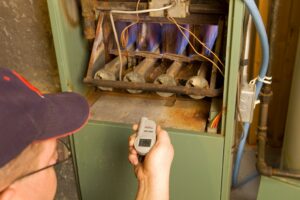
Are you a homeowner that’s never really thought about your furnace system until now, but now has some burning questions? Or perhaps you’re a homeowner that’s always been quite curious about your furnace, but you need some more intermediate answers to help you pinpoint a problem? Furnaces in Helena, MT are our specialty because they’re the most common heating system we see and service. We’d love for our community to be more understanding and knowledgeable about these types of systems, and we can start that today.
How often should I get furnace maintenance and tune-ups?
For safe, efficient, and reliable operation, schedule a professional furnace maintenance visit at least once a year, ideally before heating season begins. Regular tune-ups keep your system running smoothly, save energy, minimize breakdown risk, and extend your furnace’s lifespan.
We’ve come up with an FAQ guide to tackle some beginner and intermediate questions for curious people that want to understand their furnaces. Be advised that this FAQ is not a tutorial to fix your furnace, or help you when you open it up and start working on repairs. For that, we only recommend you go with a professional technician who is licensed and certified to perform the work.
“How Does My Furnace Work?”
We all know that furnaces burn fuel to heat a home, but that’s not exactly the full picture. Furnaces don’t work like gas or wood-burning fireplaces, because they’re built to be much more effective and efficient heating machines. Fireplaces look cozy and can create wonderful ambiance and scents in your home, but they don’t do a very good job of heating your home efficiently.
A furnace burns natural gas or uses electrical resistance to create heat. That heat must then transfer to the clean air of your home through a component called the “heat exchanger.” This is a very important and sensitive part of your furnace because it allows the hazardous fumes and exhaust to be deposited out of your home while retaining the heat that the combustion has created. Eventually, your home will feel the heat coming through the vents and you’ll feel quite comfortable.
“What Is The AFUE Rating?”
AFUE stands for annual fuel utilization efficiency, and it’s an efficiency measurement for your furnace. Simply put—the higher your furnace’s AFUE rating, the more efficient it’s going to be. It will create more heat from less fuel, costing you less in heating costs and making you feel comfortable. If your current system isn’t performing efficiently, it might be time to explore furnace replacement options to reduce energy waste and costs.
The AFUE is also a percentage. A furnace with an AFUE of 80 tells us that 80% of the fuel that’s burned is turning into heat. That other 20% is a loss of inefficiency, and if your furnace is running with that level of AFUE rating, it might be time for an upgrade. Most furnaces run with AFUE ratings of above 90, and some are even as high as 98!
“What If My Heat Exchanger Is Damaged?”
For the more experienced furnace owners out there, you might already know about how vital the system’s heat exchanger is. If your furnace has been rattling or making noises that signify vibrations and shudders, then your heat exchanger could be at risk of cracking. A cracked heat exchanger will leak gas, carbon monoxide, and other fumes into your home.
This is a safety hazard that cannot be ignored. If you’re operating a furnace in your home, your heat exchanger must always be in good condition. If you suspect it’s not, or don’t even know the condition of your heat exchanger, then finding the best HVAC experts is essential to ensure safety and prevent further risks.
Contact Ambient Air Solutions today for comprehensive furnace care. Simplifying heating & cooling.
